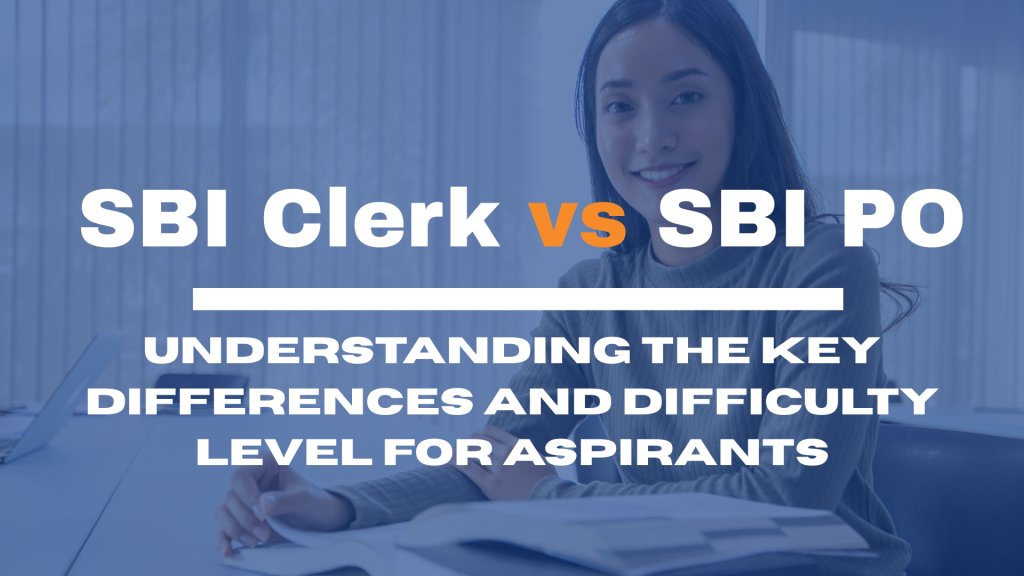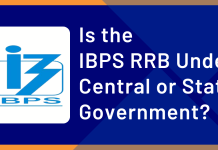The State Bank of India (SBI) is one of the most prominent public sector banks in India, popular for providing some of the best job opportunities in the country in the banking sector. Among the various exams organized by SBI, two very popular positions are SBI Clerk and SBI PO. Both of these roles provide an excellent career path with attractive salary and growth opportunities, but they differ significantly in terms of job responsibilities, selection process, and difficulty level. Therefore, if you are looking to apply for either SBI Clerk or SBI PO exam, it’s essential to know the differences between the two and also the level of difficulty of each exam. We shall go ahead and observe the main differences that exist in between the SBI Clerk exam and SBI PO exam as we go forward, primarily with regard to their pattern and difficulty levels.
SBI Clerk has a rather easier pattern with less intensity in comparison to the more complex responsibilities handled by SBI PO. By the end of this blog, you will be able to make an informed decision about which exam best aligns with your interests and capabilities, including roles at institutions like Indian Bank.

SBI Clerk vs SBI PO: What’s the Difference?
The two posts mainly differ in the responsibility of their job profiles. For example, the SBI Clerk exam focuses on clerical work like customer service and data entry, while managerial work like branch supervision, decision-making, and much more is involved in SBI PO. The exam for SBI PO has a higher difficulty level than for the Clerk exam. Complex reasoning and financial awareness skills are required for this role, which includes responsibilities akin to those at Indian Bank.
| Aspects | SBI Clerk | SBI PO |
| Post | Junior Associate (Customer Support and Sales) | Probationary Officer (Management Trainee) |
| Nature of work | Routine customer questions handling, cashiering work, clerical work data entry, accounts handling | Work involving supervisory status with administrative tasks, opening branches handling, and decision-making |
| Promotion Scope | Slower promotion as only to the higher rank Clerical cadre | Immediate Promotions to higher grade as Assistant Manager, deputy Manager and so on |
| Package offered in terms of salary in Crores | ₹ 19,900 to ₹ 47,920 (Basic Pay) | ₹41,960 to ₹ 71,200 (Basic Pay) |
| Work Stress | Relatively low work pressure | Higher work pressure with managerial responsibilities |
| Job Stability | High job stability with less responsibility | Greater responsibility, but provides more rapid career progression |
| Eligibility | Graduate in any stream (Age: 20–28 years) | Graduate in any stream (Age: 21–30 years) |
SBI Clerk Exam: Overview
The SBI Clerk is a passway to be a Junior Associate in the SBI in which aspirants manage day-to-day work, customer care, and clerical tasks.The pattern of Clerk exam contains two phases which are preliminary and Mains exams.The difficulty level of Clerk exam is more low-level than the SBI PO, which has complex patterns with higher difficulty level. Understanding the difference between these exams helps candidates prepare for roles like those at Indian Bank.
SBI Clerk Exam Pattern
- Preliminary Exam: The preliminary exam of the SBI Clerk exam pattern focuses on basic skills in reasoning, quantitative aptitude, and the English language. It’s a pattern that is more simple than the SBI PO exam, which poses more difficulty. It does well to know the differences as this will aid them to prepare for the Clerk exam and roles in such institutions as Indian Bank.
| Section | No. of Questions | Marks | Time Limit |
| English Language | 30 | 30 | 20 minutes |
| Numerical Ability | 35 | 35 | 20 minutes |
| Reasoning Ability | 35 | 35 | 20 minutes |
| Total | 100 | 100 | 1 hour |
The preliminary exam is merely qualifying in nature; it means that your marks of this round do not form part of the final selection.
- Mains Exam: The Mains exam for the SBI Clerk exam has four sections, and one needs to be good at all of them to move forward. It is different from the SBI PO exam, which has a more complex pattern and is more difficult in comparison. The Clerk exam focuses on clerical duties with a simpler approach.
| Section | No. of Questions | Marks | Time Limit |
| General/Financial Awareness | 50 | 50 | 35 minutes |
| General English | 40 | 40 | 35 minutes |
| Quantitative Aptitude | 50 | 50 | 45 minutes |
| Reasoning Ability | 50 | 60 | 45 minutes |
| Total | 190 | 200 | 2 hours 40 minutes |
The Mains exam tests a candidate’s reasoning, mathematical, and English skills at a higher level compared to the Prelims.
- Interview: After clearing the Mains exam, candidates for SBI Clerk exam are called for the interview that happens to be the final selection process. The SBI PO exam has a much tougher selection process and level of difficulty as compared to Clerk exam that focuses on clerical work with a pattern being much simpler.
SBI Clerk Exam Difficulty Level
The SBI Clerk Exam is moderate in its standard level of difficulty; as it is more feasible while compared to the Mains that have more complex questions as well. As such the candidates can do pretty fine if they maintain proper consistent practice and understand basic knowledge. The pattern for an SBI PO exam differs significantly, with more difficult paper patterns and also of great difficulty, but Clerk makes a focus on more base skills, job roles difference too, for instance those in Indian Bank.
SBI PO Exam Overview
The SBI PO exam is a more challenging exam compared to the Clerk exam. As a Probationary Officer, you would be in charge of the branch, oversee the clerical staff, and maintain the smooth flow of bank operations. This exam is more challenging than others as it is managerial in nature, and the selection procedure is very stringent.
SBI PO Exam Pattern
- Preliminary Exam: Just like the SBI PO exam pattern, the SBI PO Preliminary test has three
| Section | No. of Questions | Marks | Time Limit |
| English Language | 30 | 30 | 20 minutes |
| Quantitative Aptitude | 35 | 35 | 20 minutes |
| Reasoning Ability | 35 | 35 | 20 minutes |
| Total | 100 | 100 | 1 hour |
The Prelims are qualifying in nature even for the SBI PO.
- Main’s Exam: This is much more comprehensive in nature which has both objective and descriptive papers. Pattern is the following:
| Section | No. of Questions | Marks | Time Limit |
| Reasoning & Computer Aptitude | 45 | 60 | 60 minutes |
| Data Analysis & Interpretation | 35 | 60 | 45 minutes |
| General/Financial Awareness | 50 | 50 | 35 minutes |
| English Language | 35 | 40 | 40 minutes |
| Total | 160 | 200 | 3 hours |
It is very stringent and requires robust problem solving skills, mainly in reason and data analysis.
- Interview and Group Exercise: After clearing the Mains exam candidates have to face a Group Exercise and Interview. To my mind, this all makes the whole selection very complex. Both the elements check leadership skills, quality of decision making, communication, etc.
Level of difficulty SBI PO
is more challenging compared to that of SBI Clerk simply because it’s a relatively complex exam and requires an elevated level of responsibility connected with the profile.
That is, Mains proves to be way tougher compared to the previous exams conducted. It is really competing in nature as well- requires conceptual understanding, speed, as well as accuracy. Next, an interview with a group exercise tests the candidate on managerial skills.
Major difference between SBI Clerk Vs SBI PO
Now that we have an idea of the thing, let’s talk about what is the primary difference between the SBI Clerk and the SBI PO exam. The Clerk exam is more focused on clerical activities with a moderate degree of complexity and a less complex pattern. SBI PO also includes more complex duties like managerial roles as well as greater levels of complexity. Expected with a bank position in SBI PO examinations, often relating to what is expected at Indian Bank institutions:
- Job Role and Responsibilities:
- SBI Clerk: Clerical works, customer handling, account management, cashiering and data entry.
- SBI PO: Head for the bank branches, management of staff, decision making, customer handling and the administrative tasks.
- Promotions and Career Growth:
- SBI Clerk: Very slow promotion to the clerical higher designations.
- SBI PO: Rapid advancement to the management grade level of Assistant Manager, Deputy Manager, etc.
- Exam Level:
- SBI Clerk: The level is middle range. Suitable for those students who know about the basic banking concept.
- SBI PO: Highly examination. Needs sound reasoning, mathematical, and leadership ability.
- Salary and Allowance
- SBI Clerk Salary : ₹ 19,900–₹ 47,920 (Basic Pay)
- SBI PO Salary : ₹ 41,960–₹ 71,200 (Basic Pay).
Which one to Choose?
Both the exams have promising career prospects, but the choice between SBI Clerk and SBI PO depends on your interest, career goals, and preparation level. If you want a more hands-on role with less responsibility, then the SBI Clerk exam would be ideal. However, if you aspire to climb the corporate ladder quickly and take up more managerial roles, then the SBI PO exam would be a better choice.
Important Tips to Crack SBI Clerk and SBI PO Exams
To crack the SBI Clerk exam and the SBI PO exam, know the pattern and how tough they are. The SBI Clerk exam mainly focuses on speed and accuracy in Prelims. In SBI PO, improvement in reasoning aptitude and financial knowledge is essential. Regular mock tests should be done in both cases. Know the difference in roles between the two posts. For SBI PO, it demands more managerial abilities. It is important for both to keep track of current affairs, including updates on Indian Bank.
For SBI Clerk Exam: –
- Time Management: The Preliminary exam is about speed and accuracy. Attempt simpler questions first to gain maximum scores.
- Practice Mock Tests: In order to get familiarized with the type of paper, you can practice as many SBI Clerk mock tests as possible. Mock tests can make you aware of your areas of strength and weaknesses.
- Improve Vocabulary: English Language is one of the main sections in both Prelims and Mains. Hence, work on improving the vocabulary and grammar.
To prepare for SBI PO Exam:
- Descriptive Test: Most of the applicants tend to neglect the Descriptive Test while preparing for SBI PO. As a result, write some essays, formal letters to enhance writing skills.
- Brush Up on Financial Awareness: Since the SBI PO exam demands high financial awareness, keep yourself updated reading newspapers and financial journals.
- Group Exercise Preparation: Group Exercise round is crucial for the SBI PO candidates. Practice your leadership and team-building skills.
Conclusion
Thus, both SBI Clerk and SBI PO offer types of career opportunities in the banking industry. SBI Clerk is easier but more time-consuming, whereas SBI PO is tougher but will result in fast promotion with much managerial responsibility. If proper preparation is done, then passing either of the examinations will result in successful and satisfying careers through SBI.
If you are preparing for these exams, you can join ixamBee for expert guidance, online mock tests, and video courses that would help you crack this exam with ease. All the best to you in preparing with success and choosing based on your aspirations!
Boost your preparation for the SBI Clerk exam and SBI PO with ixamBee’s comprehensive SBI Circle Based Officer online courses and mock tests. Our SBI Clerk (Prelims) mock tests and SBI PO Mains PYP provide the perfect practice for tackling real exam challenges. Additionally, the Target Banking Online Course ensures a focused approach to all banking exams. Prepare smarter with ixamBee for guaranteed success!
At ixamBee, we specialize in providing comprehensive online courses for government exams and online courses for government jobs. Our expertly designed courses for government jobs cater to a wide range of upcoming government exams. Whether you’re preparing for specific courses for government exams or seeking general guidance, ixamBee offers the resources like Beepedia previous year papers, SSC CGL, SSC CHSL, SSC MTS and other mock tests to succeed in exams like RBI Grade B, SEBI Grade A, NABARD Grade A, RRB NTPC, SSC MTS, NIACL Assistant, and more.
Also read:
What is the Typical Timeline for Becoming a PO or Clerk After Passing an SBI Exam?
How to Apply for SBI PO Exam 2024-25: Online Application, Link, and Fee
How to Improve English section for the SBI PO Exam














